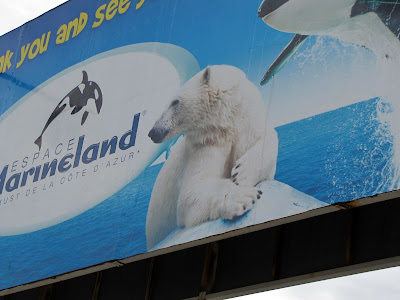 |
| The sign in the parking lot of Marineland in 2017 |
This week it was announced by Marineland in Antibes, France, that Flocke and her triplets had already moved to Yorkshire Wildlife Park, and the polar bear habitat on the French Riviera would become home to penguins. The French aqua park would no longer have polar bears. Marineland had been closed for a time because of the Coronavirus pandemic, and was announcing that it would reopen to the public on June 11.
Marineland was home to polar bears for 11 years, from April of 2010 to June of 2021.
 |
| In the old days, at Marineland, Flocke rests on top of the stone arch, while Raspi waits for her to come down. Raspi always wanted to be with Flocke. Flocke sometimes wanted a break. |
Marineland had been closed in the spring of 2020, but did reopen for a time in the summer and fall, then closed again.
 |
| Flocke and Raspi together in 2018, after daughter Hope left for Sweden |
The rare birth of polar bear triplets made it even sadder that the park was closed for so many months, but some European visitors were lucky enough to see the cubs. I, being in Ohio, missed that experience, but my friend Ralph from Oxford, England, went for a week in August of 2020, when the cubs were still rather small.
 |
| My friend Ralph traveled to France to visit Flocke and her cubs, and gave me permission to use this photo of the little family. Raspi had already moved to YWP |
The triplets' father, Raspi, had moved to Yorkshire Wildlife Park shortly after the cubs were born, so Flocke could raise the kids in peace and quiet. For ten months, Raspi lived in YWP, separated and at a distance from the other four bachelor polar bears, from the end of January to mid November 2020, at which time he moved to Tallinn, Estonia as a companion to female bear Friida.
 |
| At Marineland in 2018, Flocke swims and Raspi waits for her. |
 |
| Flocke with Hope, who was born in 2014 in Marineland |
There in Marineland, Flocke and Raspi enjoyed three spacious enclosures. The top two enclosures feature large pools, rocky areas and grass, while the lower enclosure was built for mother and cubs, with a shallow pool, babbling brook, and a grassy meadow, as well as a snow cave. There is also a snow cave in one of the top areas. The bears could enjoy cooling breezes from the Mediterranean Sea, just down the hill, or if they prefer, the air conditioning inside. The keepers have taken wonderful care of the bears.
Raspi and Flocke's first cub Hope was born in 2014.
 |
| Little Hope in Spring of 2015 |
 |
| Hope and Flocke in the ice grotto. |
It is a shame that this state of the art facility for polar bears is now empty, but it will still be of use, for the Marineland penguins.
 |
| Flocke and her tree at Marineland |
 |
| Raspi, behind the gate, could come down and visit his daughter Hope in the lower enclosure. |
 |
| Hope is entranced with a visitor on stilts. The Marineland bears loved to see who was coming to visit. |
After Raspi left YWP for Tallinn, the remote enclosure where he lived at YWP, with rolling grassy meadow, climbing structure, foliage and a lovely pond in which to swim, was empty. It seemed to make sense for Flocke, along with her 18 month old cubs, to make the move to the UK.
 |
| The entrance to Project Polar at YWP where the bachelor group of four young males lives. Flocke's home is across the park. |
So now there are eight polar bears at YWP. Flocke and her cubs are some distance from Project Polar, where the young boy bears (Nobby, Hamish, Sisu and Luka) live, rotating through three spacious enclosures, each with a big pond. Polar bears have very sensitive noses, so the boys might smell a female, but it would be faint, not dissimilar to Highland Wildlife Park in Scotland, where Victoria lives alone, on the other side of the park from Arktos and Walker except during breeding season.
There will be a settling in period, where Flocke's family will have time to adjust to their new home without visitors watching them.
I visited Marineland many times, always staying for four or five days at a time, at the Bastide de la Brague across the road from Marineland. The bears had much to keep them busy, with toys and other enrichment. Raspi always liked to swim his laps, unless he could be with his Flocke.
 |
| Raspi swimming his laps at Marineland |
 |
| Flocke and Hope, swimming and playing |
Flocke, who had been raised by humans, amazed everyone with her great mothering skills with daughter Hope, and is doing a great job of raising triplets.
So, after the initial period without the public, the folks at YWP will have fun getting to know Flocke and her cubs, the boys Yuma and Indiana, and daughter Tala, also called Rasputina by some because she is so like her father.
 |
| Flocke was all dirty, and Raspi didn't care. He always thought she was beautiful. |
I will miss my beautiful days on the French Riviera, and all the lovely people I have met there. It was an idyllic place for polar bears to live and play. I am sad that those magical days are over.